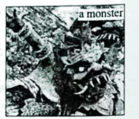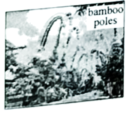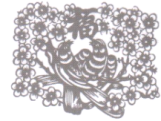Improvements in technology often happen overnight. Some gadgets get smaller and faster. Others are replaced (代替) by newer things like smartphones. They can do hundreds of things. Here are some old gadgets that people used to use.
①________
Do you have a landline at home? These are phones that people plug (插入) into their living room walls. Mobile phones didn’t use to be so common at that time, so most families had a landline. But landlines only worked at home. What did people do when they were outside and needed to call someone? They looked for a pay phone! Then, most people had their own mobile phones and many homes no longer had landlines.
②________

People today store plenty of information online, or on SD cards. But in the 1980s and 1990s, people used to use floppy disks. The first floppy disks were large, expensive, and not very useful — each disk could store just 175 KB of information! Later, floppy disks got smaller and better. But even the best ones could only hold 1.44 MB. You would need three or four disks just for one song, and about 22,000 disks to match the storage (储存空间) available on a 32 GB phone!
③________

It’s easy to take photos today. People often have thousands just on their phones! But photos used to be expensive, and people took fewer of them. To take a photo, you had to buy a roll of film. This allowed you to take about 30 photos. After finishing the roll, you left it at a shop. The shop developed the photos to make them be seen, which you could collect after a few days.
Technology changes all the time, and the gadgets we use today will one day be old. What do you think will be next to disappear?
(1). What does the underlined word “gadgets” mean in Paragraph 1?
| A. | Toys. |
B. | Tools. |
C. | Games. |
D. | Phones. |
(2). Match the title with each paragraph.
a. Goodbye Disks b. Music to My Ears c. Picture This d. Call Me e. Film Development
| A. | ①-d, ②-b, ③-e |
B. | ①-d, ②-a, ③-c |
C. | ①-c, ②-a, ③-b |
D. | ①-c, ②-b, ③-e |
(3). What were the first floppy disks like?
| A. | They could store much. |
B. | They were very useful. |
| C. | They cost a lot of money. |
D. | They were easy to carry. |
(4). What can we get from the passage?
| A. | It was convenient to take photos with film. |
| B. | People outside used landlines to call someone. |
| C. | Improvements in technology change people’s life. |
| D. | For a time, many people had pay phones at home. |
(5). What would be the best title for the passage?
| A. | The Changing Phones. |
B. | The Products of Tomorrow. |
| C. | Old Things We Use Today. |
D. | The Things We Used to Use. |

Indonesians love to celebrate. They believe that celebrating and eating together brings good luck. Let’s party Indonesia-style.
Would you be surprised to find a New Year’s Day in March? Indonesians on the island of Bali are getting ready to ring in Nyepi, their New Year. It falls in March or April on the night of the new moon and is a symbol of a fresh start for the people and the island of Bali. On the eve of Nyepi, families and friends get together in the market. They carry a huge monster which is made of wood and other materials around the village three times. After that, people set it on fire, hoping to drive out evil (邪恶的) spirits.
After Nyepi, a Turun tanah ceremony begins in honor of a child’s first steps. At the Turun Tanah, parents invite friends and family to a party to introduce the baby. They put different objects such as a bracelet (手镯), pen, mirror or toy computer around their baby. If the baby picks up a pen, he or she may be a writer. A child who picks up a gold bracelet may be rich.

While Turun tanah celebrates the future of a family. Galungan celebrates its past. Ancestors who have died return ‘home’ during this ten-day celebration. And living relatives do their best to make them happy. Tall bamboo poles line the street. People attend the ceremonies and visit their family and village temples. Actors and dancers give performances that tell stories of good fighting against evil.
A year of festivals has come to an end. Don’t worry: next year, Indonesia will be buzzing (发出嗡嗡声) again with celebrations, so welcome to the party!
(1). What’s the theme (主题) of the passage?
| A. | Celebrations. |
B. | Feelings. |
C. | Family. |
D. | Health. |
(2). What do people do during Galungan? Check and choose the right answer.
①Watch performances. ②Discuss new babies’ future.
③Visit their family and village temples. ④Put the bamboo poles along the street.
⑤Carry a huge monster around the village.
| A. | ①②⑤ |
B. | ①③④ |
C. | ②③④ |
D. | ③④⑤ |
(3). Which of the following is TRUE according to the passage?
| A. | The baby who picks up a pen may be a writer. |
| B. | Nyepi usually comes after Turun tanah in Bali. |
| C. | New Year’s Day in Indonesia begins in February. |
| D. | People fire bamboo poles to drive away the monster. |
(4). Which of the following best shows the structure of the passage?
| A. |
|
B. |
|
C. |
|
D. |
|
(5). What is the writer’s purpose according to the passage?
| A. | To welcome us to the festivals. |
B. | To show us how to treat the ancestors. |
| C. | To tell us how to hold the party. |
D. | To teach us how to fight against the evil. |
Why is the sea salt? Long before we discovered scientific ways of thinking about it, we explained it in a story. Even though the answer isn’t scientific, it holds some other truth in it — especially about the human heart.
Long ago, a poor old couple lived on the coast. One day, an old storyteller came to their village. The old couple gave him a meal. In return, he gave them a coffee mill (磨粉机) and said, “Say, ‘Mill, please grind (磨粉)’,” and it’ll make whatever you want, to stop it, say ‘Mill, please cease (停止) grinding’.”
Soon the old couple had a much better life. They’d been happy people, and they didn’t need much more. But the young couple next door were never satisfied. When they saw the old couple wearing good clothes and buying good food, they burnt with envy (羡慕). So one day, the young husband went to the old couple’s house secretly and heard, “Mill, please grind hot chocolate!” He was surprised to see it coming out.
Then the young couple stole the mill from the old couple. With it, they rode a horse and set off down the coast, where no one would know them. Along the way, the husband showed proudly and asked, “What do you want it to make?” “Oh. I don’t know. Why not salt?” the wife said. “Mill, please grind salt!” he said. “It works!” the wife shouted. But then they noticed the salt went everywhere. “Make it stop,” the wife said. But the husband didn’t know how. “Mill, please stop grinding! Please, no more!” His words didn’t work. The mill kept grinding. Finally, the young husband threw the mill into the sea as far as he could.
And there it’s been, for hundreds of years, endlessly grinding salt. That’s why the sea is salt.
(1). The passage is probably a(n) ________.
| A. | folk story |
B. | instruction |
C. | science fiction |
D. | science report |
(2). Put the things happened to the mill in correct order.
a. It began to produce salt. b. The young husband threw it.
c. The young couple stole it. d. The old couple got it.
| A. | b-d-a-c |
B. | b-a-d-c |
C. | d-a-c-b |
D. | d-c-a-b |
(3). What does the underlined word “it” in Paragraph 4 refer to?
| A. | The coffee. |
B. | The horse. |
C. | The mill. |
D. | The chocolate. |
(4). How did the young husband’s feelings change?
| A. | sorry — sad — excited |
B. | thirsty — excited — afraid |
| C. | happy — nervous — proud |
D. | surprised — thankful — happy |
(5). What does the word “truth” in Paragraph 1 imply (暗指)?
| A. | Being patient. |
B. | Working properly. |
C. | Being satisfied. |
D. | Listening carefully. |
●Gift shop Open Daily 10:00 a.m.—5:30 p.m. ●Children’s playground and activity area ●Visitors may adopt (领养) a rescued animal for free!
Admission: Adults: $7 Children (up to 16): $5 Children (3 & under): Free Family (2 adults & 2 children): $20 FREE CAR AND COACH PARK. TOILET FOR THE DISABLED AND WHEELCHAIR ACCESS (通道) IN ALL AREAS. |
(1). When can the visitors buy the gifts?
| A. | At 9:30 a.m. |
B. | At 11:00 a.m. |
C. | At 6:00 p.m. |
D. | At 10:00 p.m. |
(2). How much is a ticket for a 15-year-old boy?
| A. | $5. |
B. | $7. |
C. | $12. |
D. | $20. |
(3). What do we know about the museum?
| A. | It doesn’t provide a free parking lot. |
B. | The animals there can’t be adopted. |
| C. | It offers the disabled special service. |
D. | Children under 3 are not welcome there. |
请先阅读下面短文,掌握其大意,然后用方框中所给词的适当形式填空,并将答案填写到答题卡的相应位置。每个词限用一次。
desert; space; heavy; be; when; woman; Chinese; love; hot; see; then |
Wang Yaping is an astronaut. In 2013, she became the second Chinese woman to travel to ___(1)___. She is also famous for a physics class televised for more than 60 million people.
Wang trained very hard for many years ___(2)___ an astronaut. The hardest part was ___(3)___ training. Wearing a spacesuit and carrying special and ___(4)___ equipment(装备), she walked several kilometers through the ___(5)__ and sandy desert. “Sometimes it was so windy and dusty(布满灰尘的),” she says, “that we couldn’t __(6)__ each other even though we were just a few meters away.”
Wang __(7)___ her job. She remembers watching the first __(8)__ astronaut go into space. “I was so proud and also very excited. But __(9)__ I watched it, a thought came into my mind: We have men pilots and women pilots; and __(10)__ a man astronaut. When will there be a __(11)__ astronaut? And today, it’s me becoming one of the first few.”
Sit With Us
You’re at your new school. It’s lunch time, but you don’t have anyone to sit with. You want to join someone at their table, ___(1)___ you’re not sure if they’re friendly. What do you do? Natalie’s ___(2)___ of solving the problem was to create an app. She knows what it feels like to be alone at a new school. She found it difficult to make new friends and had to ___(3)___ a new table at lunch every day. If she sat ___(4)___, she felt lonely. But if she asked to join someone and was __(5)__, she felt embarrassed. She created a lunch-planning app to help students like ___(6)___ find people to have lunch with.
The app — called Sit With Us — is ___(7)__. If a student is having lunch in the afternoon, he or she can create an invitation. Other students can open the app and __(8)___ that invitation. They can then use the app to decide when and where to ___(9)___. This allows students to make ___(10)___ online instead of face-to-face. This is the reason why it works so _ (11)__: it lowers the risk of being refused, and the embarrassment that goes along with it.
Natalie is __(12)__ to see that people are replying to her app actively — especially those who suffer from bullying (遭受欺凌). Soon after she made her app available to the public, she won a prize for it. She __(13)__ appeared in many news stories.
Natalie was even asked to speak at a university. In her ___(14)__, Natalie wanted people to know that you don’t have to do something ___(15)___ to change lives. Sometimes, a simple thing — like having a friend to enjoy lunch with — can make all the difference.
(1).
| A. | so |
B. | or |
C. | for |
D. | but |
(2).
| A. | habit |
B. | course |
C. | method |
D. | question |
(3).
| A. | search for |
B. | fix up |
C. | give out |
D. | get away from |
(4).
| A. | on time |
B. | in a hurry |
C. | by herself |
D. | in public |
(5).
| A. | called |
B. | refused |
C. | discussed |
D. | believed |
(6).
| A. | us |
B. | it |
C. | her |
D. | them |
(7).
| A. | cheap |
B. | simple |
C. | private |
D. | noisy |
(8).
| A. | miss |
B. | make |
C. | send |
D. | accept |
(9).
| A. | stop |
B. | study |
C. | meet |
D. | exercise |
(10).
| A. | plans |
B. | trouble |
C. | reports |
D. | dinner |
(11).
| A. | late |
B. | well |
C. | hard |
D. | loudly |
(12).
| A. | upset |
B. | sorry |
C. | happy |
D. | angry |
(13).
| A. | also |
B. | just |
C. | still |
D. | seldom |
(14).
| A. | book |
B. | talk |
C. | school |
D. | picture |
(15).
| A. | big |
B. | new |
C. | similar |
D. | enjoyable |
________ many things change a lot, a love of sports hasn’t changed a bit.
| A. | If |
B. | Before |
C. | Though |
D. | Because |
Mr. Smith created a new game. Soon all his students ________ rules to play it.
| A. | teach |
B. | taught |
C. | are taught |
D. | were taught |
Don’t leave your toys on the table, or I ________ them away.
| A. | threw |
B. | will throw |
C. | have thrown |
D. | was throwing |
—Who do you think will win the race, Bob or Tom?
—It must be Bob. I think he runs ________.
| A. | faster |
B. | fastest |
C. | more slowly |
D. | most slowly |
________ me, I’ll show you the way.
| A. | Follow |
B. | Forget |
C. | Leave |
D. | Punish |
I only got four hours of sleep last night, so I feel ________ today.
| A. | tired |
B. | lonely |
C. | hungry |
D. | proud |
—Sssh! Be quiet. I’m on the phone.
—Who ________ you ________ to, mom?
| A. | do, speak |
B. | are, speaking |
C. | will, speak |
D. | have, spoken |
Which ice cream do you want, Mary? You can’t have all of them. You have to make a ________.
| A. | wish |
B. | survey |
C. | choice |
D. | call |
阅读下面短文,将划线部分译成英文或中文。

When people say Chinese culture, we often think of paper cutting. 1. Paper cutting is an art form with a long history in China. Traditional paper-cuts were first put on windows for decoration(装饰). That is why paper-cuts are also called “window flowers”. Most paper-cuts are made of red paper, because red means good luck in Chinese culture. Today, people use paper-cuts to decorate not only windows, but also doors and other furniture(家具). 2. Sometimes, people use them as gifts.
Paper-cuts are popular because of their expressions of good wishes and hopes. During the Spring Festival, for example, many people put up paper-cuts of the Chinese character(汉字) “Fu” upside down on the door. 3. 他们希望这会给他们带来好运。 At wedding ceremonies(婚礼), you can always see paper-cuts of the character “Xi”. It means that the new couple can enjoy happiness together.
Paper cutting has developed into different styles in different parts of China. 4. Paper-cuts from the north of China usually have interesting shapes. In southern China, people prefer paper-cuts with the themes(主题)of flowers, fruit, birds and fish.
5. 学习剪纸非常容易。 With a piece of paper and a knife or a pair of scissors, you can try to make your own paper-cuts. Although paper cutting is easy to start with, you need a lot of practice and imagination to become really good at it.
(1). ______________________________________
(2). ______________________________________
(3). ______________________________________
(4). ______________________________________
(5). ______________________________________